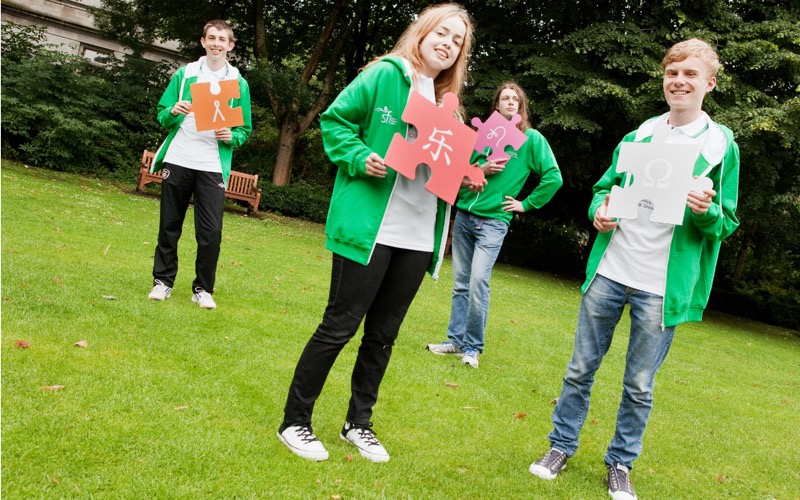Irish Students Seek Title of ‘World’s Top Language Decoder’ in Beijing
Posted on: 21 July 2014
Four Irish secondary school students from Dublin, Antrim, Kerry and Cork are ready to pit their language decoding skills against the world’s best at this week’s International Linguistics Olympiad in Beijing, China. The students honed their problem-solving skills at a training camp in Trinity College Dublin, last week, where they were tutored by experts from CNGL, the Centre for Global Intelligent Content, which is also sponsoring their trip.
The International Linguistics Olympiad challenges students to apply logic and reasoning skills to solve complex language puzzles in unfamiliar languages. Students from 30 countries are engaging in code breaking challenges, which they are tackling individually and in teams. Examples include the requirement to decipher hieroglyphics, deduce logical patterns of Swahili, and interpret Sanskrit poetry.
Representing Ireland in Beijing are Luke Gardiner of Gonzaga College, Dublin, Matthew Nixon of Aquinas Grammar School, Co. Antrim, Jane D’Altuin of Gaelcholaiste Chiarraí, Co. Kerry, and Daniel Herlihy of Douglas Community School, Cork. The four finished ahead of 2,600 opponents in this year’s All Ireland Linguistics Olympiad (AILO) to book their places in the final.

AILO is run by the CNGL Centre for Global Intelligent Content, a Science Foundation Ireland-funded research centre led by Trinity and co-hosted in Dublin City University. Competitors require no prior knowledge of a second language because even the hardest problems require only reasoning skills, logic and patience. AILO is now the largest of the Irish scientific Olympiads.
Competitor Matthew Nixon is looking forward to seeing how far his code-breaking skills can take him against the world’s best this week. He said: “Taking part in AILO was my first experience of Linguistics and I have really enjoyed putting my language and logic skills to the test as well as learning new problem-solving techniques. It is a fantastic opportunity to travel to Beijing as part of the Ireland team to compete against the top linguists from all over the world.”
Second-time International Linguistics Olympiad competitor Daniel Herlihy added: “This competition has granted me an amazing opportunity to represent my country, and has really improved my problem-solving skills. After the International Linguistics Olympiad in Manchester last year, I spent months dreaming about Beijing and competing in this year’s contest. To get the chance to do this all over again is simply unbelievable.”
Professor in Computer Science in the School of Computer Science and Statistics at Trinity, and Director of All Ireland Linguistics Olympiad organisers CNGL, Vincent Wade, said: “The four members of the Irish team for the International Linguistics Olympiad won the opportunity to represent Ireland by beating off stiff competition from more than 2,600 decoders at CNGL’s All Ireland Linguistics Olympiad. CNGL is delighted have a very talented team of students to represent Ireland at the International Linguistics Olympiad in Beijing and we are confident of a strong performance on the world stage.”
The International Linguistics Olympiad aims to inspire the next generation of multilingual technology graduates, who can combine computational thinking with advanced language skills. Many important industry sectors require graduates with this powerful combination of skills, including the multi-billion euro digital content sector in which Ireland is a world leader.
You can follow the Irish team’s progress in the competition via Facebook here.
About the International Linguistics Olympiad:
- The International Linguistics Olympiad has been held annually since 2003. Each year, teams of talented young decoders from around the world gather and test their minds, in unfamiliar languages, against some of the world’s toughest puzzles in logic and linguistics.
- Teams from 30 countries will compete in the International Linguistics Olympiad 2014 from 20-25 July at the Beijing Language and Culture University in Beijing, China.
- Ireland has entered a team each year since 2009, and team members are selected on the basis of their performance in the All Ireland Linguistics Olympiad (AILO).
- AILO is run by the CNGL Centre for Global Intelligent Content, which is funded by Science Foundation Ireland and industry partners. More than 7,500 secondary school students have competed in the Irish competition to date.
